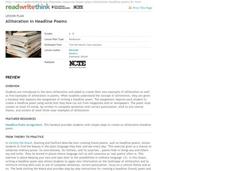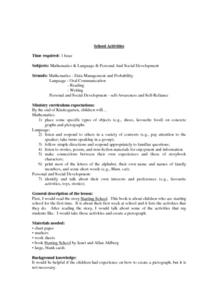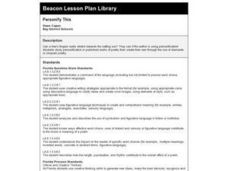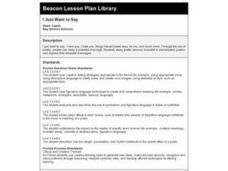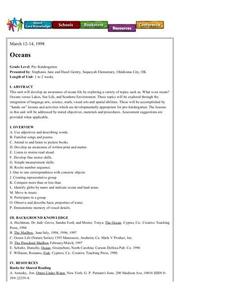ReadWriteThink
Alliteration in Headline Poems
Poetry is everywhere you look! Create found poems using headlines from newspapers and magazines. Young poetry focus on creating alliterative phrases with words they find in headlines, tying their poems to a central theme.
Wadsworth Atheneum Museum of Art
Where I'm From: Symbolism in Paint and Poetry
After a review of symbolism, class members use the provided worksheet to first list the objects they observe in Arnold Mesches' painting "Coney Island" and then suggest possible symbolic meanings for each of the objects. A second...
Curated OER
Poetry Writing Unit: Writing a Film Poem
Film poems? To concluded a poetry unit, writers select one of their own poems and create a film that brings to life the sounds and images of their work. Included with the detailed unit plan are daily lessons, student examples, a list of...
Curated OER
Lesson: Paul Chan: Alternumeric Fonts
Learning to analyze language, symbols, and codes is part of becoming a deep and critical thinker. Young analysts consider their ability to see hidden messages as they analyze the work of Paul Chan. There are two fully developed...
Curated OER
Everyone Can Write Poetry
Embark on a journey of writing several different types of poetry. Fifth graders read several examples, and use the examples to model their own writing. Each poem is to be accompanied by a different art visual representation. In the end,...
EngageNY
Analyzing, Comparing, Sharing: Modern Voices
What do modern voices sound like? Scholars explore the topic, reading two concrete poems from John Grandit's Blue Lipstick and analyzing them using a graphic organizer. Next, they read a third poem and work with partners to look for...
Curated OER
Lesson: Paul Chan: "Score for the 7th Light"
Music, art, and poetry coalesce in a single exhibition, and in a single lesson. Critical thinkers analyze the Fluxus art movement as it's seen in the work of Paul Chan's 7 Lights. They consider the use of poetry and music in his work,...
Nebraska Department of Education
Where I'm From
We are a tapestry woven of the threads of our family and its history, our environment, our ethnicity, and our culture. High school freshmen reflect on how these threads influence their goals for the future. After reading George Ella...
Curated OER
The Voices Within Theirs and Mine
Students create new words to convey their thoughts. They find, list and discuss the poetic devices used by the poet in creating his or her war poem and create their own war poems. They use sensory perception words and memory in...
Curated OER
I'm A Poet and Now I Know It
Eighth graders gather ideas generated from other poems and their own inspiration, to create original poetry. A celebration is included as students bind and submit poems for publication.
Curated OER
Show Don't Tell
Students review the Show Don't Tell method of writing haiku poetry. They practice distinguishing poetic language from academic language and create poems based on images, not explanations.
Curated OER
School Activities
First graders place some specific types of objects (e.g., shoes, favorite food) on concrete graphs and pictographs. They listen and respond to others in a variety of contexts (e.g., pay attention to the speaker; take turns speaking in a...
Friends of Fort McHenry
Sensory “Star Spangled Banner”
Music can help us to access memories and events in a meaningful way, and Francis Scott Key used specific words to convey what he had seen and felt when writing what would become America's national anthem. Help your class connect to the...
Curated OER
A Moment in Time
Eighth graders study poems to see how punctuation, line length, rhythm and word choice can be used to create a memorable moment. They read and discuss poems by Shel Silverstein.
Curated OER
Personify This
Eighth graders study personification in published works of poetry, then create their own through the use of diamante or cinquain poetry. They read and discuss poetry by Shel Silverstein, William Jay Smith, and Elinor Wylie.
Curated OER
I Just Want to Say
Eighth graders study poetic devices included in conversation poems and explore their eloquent messages. They read and discuss poems by Langston Hughes and Don Marquis.
Curated OER
The Problem with Prejudice
Third graders read and discuss "The Hangman" by Maurice Ogden and answer questions about the poem. They list things they can do to combat prejudice using each of the letters in the word and create a small poster with a slogan against...
Curated OER
Silent Stories
Students create a pictorial narrative based upon John Keats' "Ode on a Grecian Urn" and the Japanese techniques of "lacquer jar" stories in this three-day Language Arts/Art lesson.
Bully Free Systems
Bully Free Lesson Plans—Seventh Grade
Having a hard time defining bullying with your seventh graders? Discuss the different types of behavior one would see in a bullying situation with a series of lessons, worksheets, and group activities.
EngageNY
Making a Claim: Moon Shadow’s Point of View of the Immediate Aftermath
Body paragraphs are the building blocks of every essay. Pupils view and discuss a model essay using a rubric to evaluate one of its supporting paragraphs. Next, scholars use what they've learned to continue drafting their own literary...
Curated OER
Oceans
Students become aware of the differences between ocean water and lake water by smelling, tasting and seeing. They distinguish between land and bodies of water on a globe and gain increased awareness of oceans and life.


